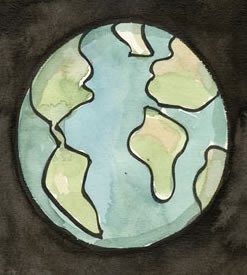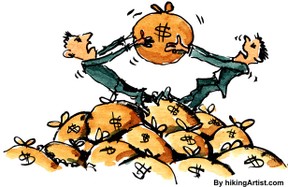 Unlike most 'doom and gloom' documentaries, Surviving Progress actually suggests some solutions to problems it describes (albeit you have to wait almost until the end of the movie to find the reasonable ones).
Unlike most 'doom and gloom' documentaries, Surviving Progress actually suggests some solutions to problems it describes (albeit you have to wait almost until the end of the movie to find the reasonable ones).
If creators of Surviving Progress are to be believed, George Lucas (he of the Star Wars) once said there are only two ways for humanity to survive as a species: either we find another planet to colonise before we completely destroy this one, or we use some of the technology we so cherish to change our very nature.
I am a big fan of Star Trek but I don't think we stand a chance of conquering space in any meaningful way any time soon. Not much hope in this solution.
Changing human nature does not appear an easy task either. Evolution is a slow process. Biologically we didn't change that much within last 50,000 years (according to the movie's stats). We might ask our biologists and geneticists to try and speed the process up but... One, you never know if they'd succeed, even if they tried. Two, playing God (and I'm using the term in the most secular meaning possible) is not a safe game. We might end up worse off than when we started. I might be wrong, but I believe genetic engineering of homo sapiens is just another progress trap on the horizon.
Either way, 'ordinary' people don't have much influence over space exploration of genetic research. There must be something that we can do on the human, everyday level. Is there?
Oh yes.
Surviving Progress suggests one simple way of if not solving, than at least alleviating our problems:
Consume less.
I couldn't agree more.
Human beings really don't need ipods (or any other sophisticated gadgetry) to function. We don't need designer bathrooms (as explained in a wonderfully passionate monologue by Vaclav Smil towards the end of Surviving Progress), cars with monstrous engines, new outfits for each days of the year etc. etc.
Market creates artificial needs through advertising and we are only too willing to believe that tons of junk on sale are truly necessary. It doesn't take a genius to question this. Everyone can look around at his or her possesion and ask - do I really need this? How much real value does it bring to my life?
It seems that the old question 'to be or to have' has only one sensible answer.


 What happens when we run out of resources to chew on? Contrary to the popular opinion, disseminated by lovely little dream-books like The Secret, the Earth is not limitless. There is only so much space available. Only so much of arable land, rainforest, oil, you name it. Once you exhaust what's there, you end up with nothing and no amount of wishful thinking or visualisation can change it.
What happens when we run out of resources to chew on? Contrary to the popular opinion, disseminated by lovely little dream-books like The Secret, the Earth is not limitless. There is only so much space available. Only so much of arable land, rainforest, oil, you name it. Once you exhaust what's there, you end up with nothing and no amount of wishful thinking or visualisation can change it. Surviving Progress is based on a book by Ronald Wright, A Short History of Progress.
Surviving Progress is based on a book by Ronald Wright, A Short History of Progress.
 Our society is seriously divided into 'haves' and 'have nots'. There's nothing new in the division itself, but over the last few decades the 'income gap' grew to monstrous proportions. It is now a chasm. If you, metaphorically speaking, look down this abyss, you can see clouds floating by far below. To quote
Our society is seriously divided into 'haves' and 'have nots'. There's nothing new in the division itself, but over the last few decades the 'income gap' grew to monstrous proportions. It is now a chasm. If you, metaphorically speaking, look down this abyss, you can see clouds floating by far below. To quote 
 The term 'progress trap' was coined by Ronald Wright and it is often mentioned in the documentary. It means, roughly, an idea/invention/system arrived at through and in the name of progress that proves harmful or dangerous in the long run.
The term 'progress trap' was coined by Ronald Wright and it is often mentioned in the documentary. It means, roughly, an idea/invention/system arrived at through and in the name of progress that proves harmful or dangerous in the long run. Unlike most 'doom and gloom' documentaries, Surviving Progress actually suggests some solutions to problems it describes (albeit you have to wait almost until the end of the movie to find the reasonable ones).
Unlike most 'doom and gloom' documentaries, Surviving Progress actually suggests some solutions to problems it describes (albeit you have to wait almost until the end of the movie to find the reasonable ones).


 Halloween – it’s time to get REALLY scaredon 08/31/2014
Halloween – it’s time to get REALLY scaredon 08/31/2014
 10 tips on how to get some writing doneon 08/31/2014
10 tips on how to get some writing doneon 08/31/2014
 Dervla Murphyon 08/26/2014
Dervla Murphyon 08/26/2014
 Forget colouring pageson 08/23/2014
Forget colouring pageson 08/23/2014



Comments
Yes, but personal choices are only a part of the picture. Big business, industry and cultural conditioning are the main culprits here I think. I don't expect everyone to be enlightened, but those who should know better choose to make money instead of improving the world. What does that say about our species?
I'm someone who's concerned for the blatant dis-concern so many have for their every day practices that are harming the world around them. I find it both lazy and self absorbed. It speaks volumes of a person. Oh don't get me started. :)K
Yes, and it gets only worse, doesn't it? Let's produce more to solve problems caused by over-production, hooray!
I agree with what you say here and I am so distressed to see how many people stay trapped in the consumerism cycle.
Same here :)
I think that's what the makers of Surviving Progress meant when they talked about 'progress trap'
Ah, shuffling papers! I can see material for a whole new whizz here. You got me inspired, 2uesday :)
Yes, beware of fashion victims ;) I think we have advertising and media to thank for this, although it would probably help if people (kids, mostly) started using less technology and more brain
It is the mindset of people that is destroying the world. Who needs five iPhones? The latest technology will continue to be built upon as long as people will wait in lines for 5 days to get the first ones. People have lost the ability to think for themselves. Instead they follow the crowds like lemmings -eventually off a cliff.